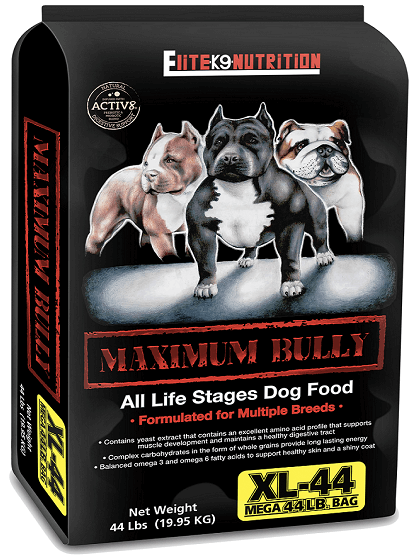
DogFoodAdvisor is reader supported See how
All reviews are 100% impartial but if you buy using links on this page, we may earn a referral fee.
Our Verdict
Maximum Bully All Life Stages Formula
Estimated Dry Matter Nutrient Content
Protein
Fat
CarbsCarbohydrates
Chicken meal, pork meal, chicken fat (preserved with mixed tocopherols), white rice, barley, pea protein, oatmeal, rice bran, spray dried egg product, dried plain beet pulp, millet, natural flavor, fish meal, salt, flaxseed meal, yeast extract, brewers dried yeast, potassium chloride, choline chloride, minerals (iron proteinate, zinc proteinate, copper proteinate, ferrous sulfate, zinc sulfate, copper sulfate, potassium iodide, manganese proteinate, manganous oxide, manganese sulfate, sodium selenite), vitamins (vitamin E supplement, thiamine mononitrate, ascorbic acid, vitamin A supplement, biotin, niacin, calcium pantothenate, pyridoxine hydrochloride, vitamin B12 supplement, riboflavin, vitamin D3 supplement, folic acid), salmon oil, dried pumpkin, dried kelp, dried carrots, dried cranberries, dried apples, dried spinach, dried rosemary, dried blueberries, dried chicory root, dried Enterococcus faecium fermentation product, dried Lactobacillus casei fermentation product, dried Lactobacillus plantarum fermentation product, dried Trichoderma longibrachiatum fermentation extract, yeast culture, mixed tocopherols (a preservative)
Fiber (estimated dry matter content) = 4%
Red denotes any controversial items
| Estimated Nutrient Content | |||
|---|---|---|---|
| Method | Protein | Fat | Carbs |
| Guaranteed Analysis | 32% | 22% | NA |
| Dry Matter Basis | 36% | 24% | 32% |
| Calorie Weighted Basis | 28% | 47% | 25% |
Ingredients Analysis
The first ingredient in this dog food is chicken meal. Chicken meal is considered a meat concentrate and contains nearly 300% more protein than fresh chicken.
The second ingredient is pork meal, another protein-rich meat concentrate. Yet it can also be high in ash — about 25-30%.
However, the ash content of the final product is typically adjusted in the recipe to allow its mineral profile to meet AAFCO guidelines.
The third ingredient is chicken fat. This item is obtained from rendering chicken, a process similar to making soup in which the fat itself is skimmed from the surface of the liquid.
Chicken fat is high in linoleic acid, an omega-6 fatty acid essential for life. Although it doesn’t sound very appetizing, chicken fat is actually a quality ingredient.
The next ingredient is white rice, a less nutritious form of rice in which the grain’s healthier outer layer has been removed.
The fifth ingredient is barley, a starchy carbohydrate supplying fiber and other healthy nutrients. However, aside from its energy content, this cereal grain is of only modest nutritional value to a dog.
The next ingredient is pea protein, what remains of a pea after removing the starchy part of the vegetable.
Even though it contains over 80% protein, this ingredient would be expected to have a lower biological value than meat.
And less costly plant-based products like this can notably boost the total protein reported on the label — a factor that must be considered when judging the meat content of this dog food.
The seventh ingredient is oatmeal, a whole-grain product made from coarsely ground oats. Oatmeal is naturally rich in B-vitamins, dietary fiber and can be (depending upon its level of purity) gluten-free.
The eighth item is rice bran, a healthy by-product of milling whole grain rice. The bran is the fiber-rich outer layer of the grain containing starch, protein, fat as well as vitamins and minerals.
The next ingredient is dried egg product, a dehydrated form of shell-free eggs. Quality can vary significantly. Lower grade egg product can even come from commercial hatcheries — from eggs that failed to hatch.
In any case, eggs are easy to digest and have an exceptionally high biological value.
From here, the list goes on to include a number of other items.
But realistically, ingredients located this far down the list (other than nutritional supplements) are not likely to affect the overall rating of this Maximum Bully product.
With seven notable exceptions…
First, beet pulp is a controversial ingredient, a high fiber by-product of sugar beet processing.
Some denounce beet pulp as an inexpensive filler while others cite its outstanding intestinal health and blood sugar benefits.
We only call your attention here to the controversy and believe the inclusion of beet pulp in reasonable amounts in most dog foods is entirely acceptable.
Next, flaxseed meal is one of the best plant-based sources of healthy omega-3 fatty acids. Flax meal is particularly rich in soluble fiber.
But, flaxseed contains about 19% protein, a factor that must be considered when judging the actual meat content of this dog food.
We also note the inclusion of fish meal, yet another high protein meat concentrate.
Fish meal is typically obtained from the “clean, dried, ground tissue of undecomposed whole fish and fish cuttings” of commercial fish operations.1
Unfortunately, this particular item is anonymous. Because various fish contain different types of fats, we would have preferred to have known the source species.
In addition, yeast extract is the common name for a broad group of products made by removing the cell wall from the yeast organism.
A significant number of these ingredients are added as specialized nutritional supplements while others are used as flavor enhancers.
However, the glutamic acid (and its chemical cousin, monosodium glutamate, or MSG) found in a minority of yeast extracts can be controversial.
That’s because even though the Food and Drug Administration designated these food additives to be safe decades ago2, the agency continues to receive reports of adverse effects.
So, detractors still object to the use of yeast extract and other glutamic acid derivatives and blame them for everything from Alzheimer’s (in humans) to obesity.
In any case, since the label reveals little about the actual type of yeast extract included in any recipe, it’s impossible for us to judge the quality of this ingredient.
Next, we find brewers yeast. Although it’s a by-product of the beer making process, this ingredient is rich in minerals and other healthy nutrients.
Fans believe yeast repels fleas and supports the immune system.
Critics argue yeast ingredients can be linked to allergies. This may be true, but (like all allergies) only if your particular dog is allergic to the yeast itself.
In addition, a vocal minority insists that yeast can increase the risk of developing the life-threatening condition known as bloat. However, this is a claim we’ve not been able to scientifically verify.
In any case, unless your dog is specifically allergic to it, yeast can still be considered a nutritious additive.
What’s more noteworthy here is that brewers yeast contains about 48% protein, a factor that must be considered when judging the actual meat content of this dog food.
In addition, this recipe contains sodium selenite, a controversial form of the mineral selenium. Sodium selenite appears to be nutritionally inferior to the more natural source of selenium found in selenium yeast.
And lastly, this food includes chelated minerals, minerals that have been chemically attached to protein. This makes them easier to absorb. Chelated minerals are usually found in better dog foods.
Nutrient Analysis
Based on its ingredients alone, Maximum Bully Dog Food appears to be an above-average dry product.
The dashboard displays a dry matter protein reading of 36%, a fat level of 24% and estimated carbohydrates of about 32%.
And a fat-to-protein ratio of about 69%.
Above-average protein. Above-average fat. And below-average carbs when compared to a typical dry dog food.
Even when you consider the protein-boosting effect of the pea protein, flaxseed meal and brewers yeast, this looks like the profile of a kibble containing a significant amount of meat.
However, with 47% of the total calories in our example coming from fat versus just 28% from protein, some recipes may not be suitable for every animal.
Maximum Bully Dog Food Recall History
The following automated list (if present) includes all dog food recalls related to Maximum Bully through July 2024.
No recalls noted.
You can view a complete list of all dog food recalls since 2009 here.
Our Rating of Maximum Bully Grain-Inclusive Dog Food
Maximum Bully All Life Stages is a grain-inclusive dry dog food using a significant amount of named meat meals as its main source of animal protein, thus earning the brand 5 stars.
Compare Maximum Bully Dog Food
How does Maximum Bully compare with The Dog Food Advisor's most recommended brands?
Sources
A Final Word
The Dog Food Advisor does not accept money, gifts, samples or other incentives in exchange for special consideration in preparing our reviews.
However, we do receive a referral fee from online retailers (like Chewy or Amazon) and from sellers of perishable pet food when readers click over to their websites from ours. This helps cover the cost of operation of our free blog. Thanks for your support.
For more information, please visit our Disclaimer and Disclosure page.







